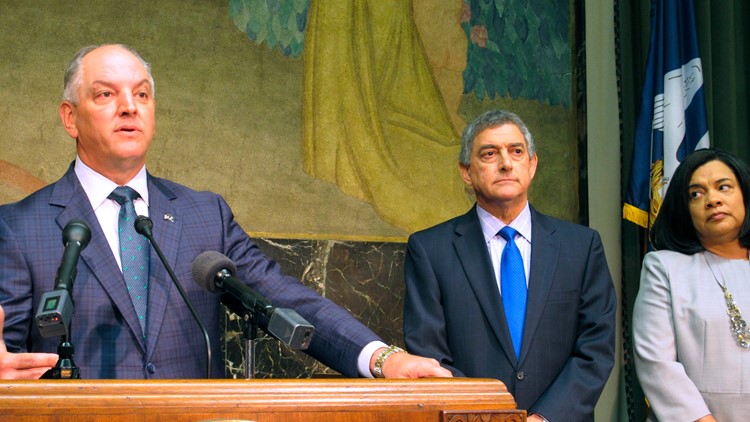BATON ROUGE, La. — Estimates of Louisiana's latest budget surplus grew to $500 million on Friday, news that adds further fuel to an ongoing debate among candidates for governor over the state's financial stability and tax rates.
Gov. John Bel Edwards, a Democrat, previously said he expected the leftover cash from the budget year that ended June 30 to top $300 million. With the state's financial books finally closed Thursday night, Edwards' chief budget adviser, Commissioner of Administration Jay Dardenne, told state lawmakers the surplus would reach around $500 million instead.
"This is very good news for the state, and it's going to create an opportunity to invest further in some of the dramatic needs that we have in our infrastructure system," Dardenne told the joint House and Senate budget committee.
The news falls in the final weeks of a hotly contested governor's race, where Edwards' Republican challengers on the Oct. 12 ballot — U.S. Rep. Ralph Abraham and businessman Eddie Rispone — are criticizing the Democratic governor for supporting tax hikes.
Lawmakers disagreed about whether the half-billion-dollar surplus was the sign of a strong economy, the result of President Donald Trump's tax changes or an indication that Louisiana residents are paying too much in taxes.
RELATED: New Orleans gets credit upgrade
The surplus comes from higher-than-expected personal income and corporate tax collections, Dardenne said, not from the temporary sales tax that lawmakers and Edwards enacted last year. Dardenne and Democratic lawmakers suggested an improving Louisiana economy helped drive those larger tax collections.
Several Republican legislators resisted that idea, saying they didn't see a booming economy in their districts. They credited the federal tax code rewrite enacted by Congress and signed by Trump for the increased tax collections. Dardenne agreed that the federal tax changes were at least a partial driver of the surplus.
Louisiana has tied some of its tax deductions to federal income taxes, so a drop in federal tax liabilities under the congressional tax changes means Louisiana taxpayers and businesses owe more to the state.
In addition, lawmakers passed several rounds of corporate tax break changes since 2015 that economists say have taken time to show up in tax collections.
House Republican leader Lance Harris, of Alexandria, questioned if Louisiana should reduce taxes after three years of consecutive surpluses. Harris tried unsuccessfully earlier this year to phase out the seven-year sales tax compromise that Edwards and the majority-GOP Legislature passed in 2018 to balance Louisiana's budget.
"I am concerned about the growing surpluses from year to year to year," Sen. Sharon Hewitt, a Slidell Republican, agreed. "Citizens in our state are paying higher taxes to create that."
Dardenne warned against a "knee-jerk reaction" only a year after lawmakers reached a tax deal that ended a decade's worth of financial instability and budget shortfalls.
Republicans were split on tax cuts. Port Allen GOP Sen. Rick Ward noted Louisiana has an estimated $18 billion in road and bridge work needs, public college building repairs and other maintenance obligations.
"How would we ever begin to address that if we go back to deficits?" Ward said.
Under Louisiana's constitution, surplus dollars can only be spent on certain one-time expenses, such as debt payments, road improvements, construction work and coastal projects. At least 10 percent must pay down retirement debt, and a quarter of a surplus is earmarked for the "rainy day" fund.
Once $125 million of the latest surplus is steered to the rainy day fund, Dardenne said the savings account would be at its highest level since 2012, before lawmakers tapped it several times to fill budget gaps.



